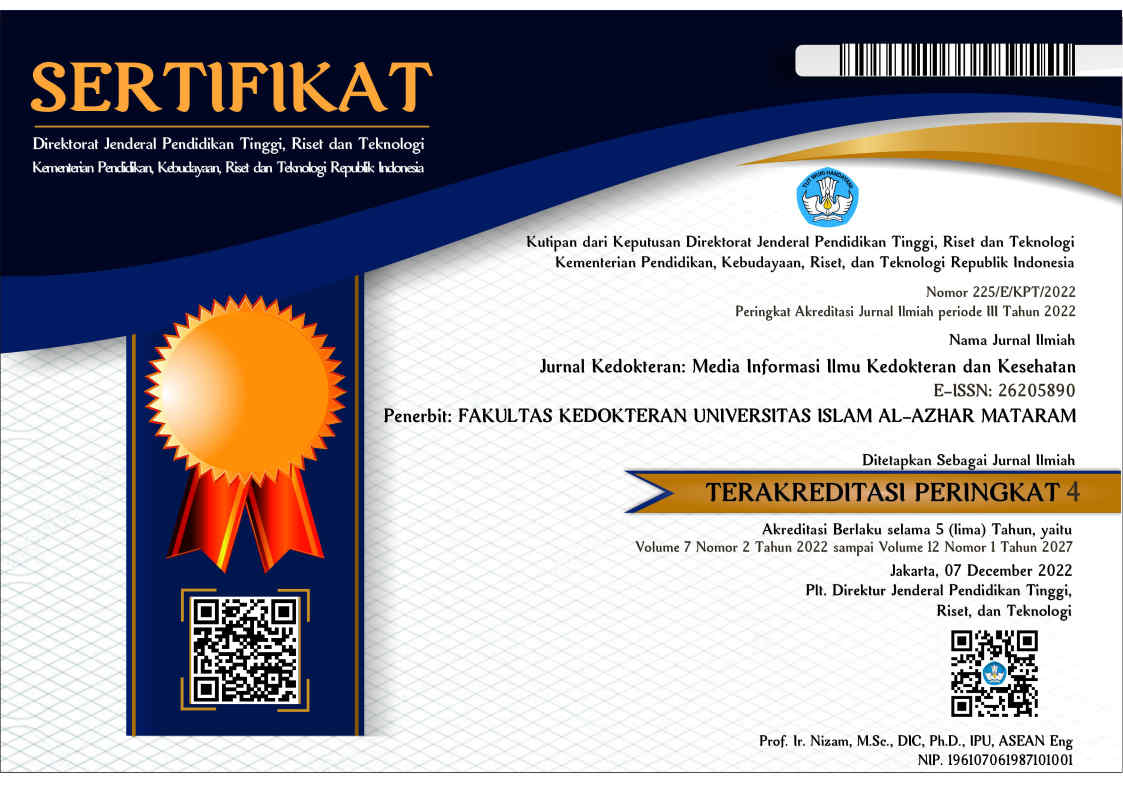Evaluation of Body Mass Index as a Marker for Monitoring of Intensive Phase Therapy and Vitamin D Supplementation in Pulmonary TB
DOI:
https://doi.org/10.36679/kedokteran.v10i1.112Keywords:
mycobacterium tuberculosis, body mass index, malnutrition, marker, anti-tuberculosis drug, nutritional statusAbstract
Background: In 2022, the success rate of tuberculosis (TB) treatment in Indonesia was 86.50%, which was below the 90.00% target. The decline in nutritional status among TB patients can result from anorexia, leading to inadequate nutrition. In TB patients, the intensive phase of treatment carries a risk of 3,021 times greater for developing malnutrition. It is associated with delayed healing, increasing the risk of death and TB recurrence. This study aimed to observe changes in body mass index (BMI) in TB patients as a marker for measuring the success of the treatment. Methods: This analytical experimental study used a one-group pre-test and post-test design, applying a purposive sampling method. The study sample included all patients diagnosed with TB who met the inclusion and exclusion criteria, with a minimum sample size of 15. Results: As many as 15 new patients were diagnosed with pulmonary TB. Height and weight measurements were taken to determine their BMI. Most respondents had a BMI below normal before therapy, with 6 people (40.00%) classified as thin. After receiving anti-TB drugs and vitamin D therapy for 2 months of intensive treatment, this number decreased to 2 people (13.30%). Results from the paired t-test showed a p-value of < 0.001, indicating a statistically significant difference in nutritional status before and after two months of anti-TB drug and vitamin D therapy. Conclusion: Changes in BMI were observed in pulmonary TB patients after receiving the anti-TB drug therapy and vitamin D for two months during the intensive phase.
References
Cho, S. H., Lee, H., Kwon, H., Shin, D. W., Joh, H.-K., Han, K., Park, J. H., & Cho, B. (2022). Association of underweight status with the risk of tuberculosis: a nationwide population-based cohort study. Scientific Reports, 12(1), 16207. https://doi.org/10.1038/s41598-022-20550-8
Ernawati, K., Ramdhagama, N. R., Ayu, L. A. P., Wilianto, M., Dwianti, V. T. H., & Alawiyah, S. A. (2018). Perbedaan Status Gizi Penderita Tuberkulosis Paru antara Sebelum Pengobatan dan Saat Pengobatan Fase Lanjutan di Johar Baru, Jakarta Pusat. Majalah Kedokteran Bandung, 50(2), 74–78. https://doi.org/10.15395/mkb.v50n2.1292
Faurholt-Jepsen, D., Range, N., PrayGod, G., Jeremiah, K., Faurholt-Jepsen, M., Aabye, M. G., Changalucha, J., Christensen, D. L., Krarup, H., Witte, D. R., Andersen, A. B., & Friis, H. (2012). The role of diabetes on the clinical manifestations of pulmonary tuberculosis. Tropical Medicine & International Health : TM & IH, 17(7), 877–883. https://doi.org/10.1111/j.1365-3156.2012.03002.x
Franco JV, Bongaerts B, Metzendorf MI, Risso A, Guo Y, Peña Silva L, Boeckmann M, Schlesinger S, Damen JA, Richter B, Baddeley A, Bastard M, Carlqvist A, Garcia-Casal MN, Hemmingsen B, Mavhunga F, Manne-Goehler J, Viney K (2024). Undernutrition as a risk factor for tuberculosis disease. Cochrane Database Syst Rev. 11;6(6):CD015890. https://doi.org/10.1002/14651858.cd015890.pub2
Gupta, S., Yamada, G., Mpembeni, R., Frumence, G., Callaghan-Koru, J. A., Stevenson, R., Brandes, N., & Baqui, A. H. (2014). Factors associated with four or more antenatal care visits and its decline among pregnant women in Tanzania between 1999 and 2010. PloS One, 9(7), e101893. https://doi.org/10.1371/journal.pone.0101893
Kementerian Kesehatan Indonesia. (2023). Laporan Program Penanggulangan Tuberkulosis Tahun 2022. In Kemenkes RI. https://tbindonesia.or.id/pustaka_tbc/laporan-tahunan-program-tbc-2021/
Khoirunnisa, Mufiidatun Ummah ZA, Putri Sari Wulandari, Raihanah Suzan, Rita Halim, & Erny Kusdiyah. (2023). Hubungan Status Gizi Dengan Tuberkulosis Di Puskesmas KotaJambi. E-SEHAD, 4(2), 99–108.
Kumar, N. P., Nancy, A. P., Moideen, K., Menon, P. A., Banurekha, V. V., Nair, D., Nott, S., & Babu, S. (2023). Low body mass index is associated with diminished plasma cytokines and chemokines in both active and latent tuberculosis. Frontiers in Nutrition, 10(May), 1–10. https://doi.org/10.3389/fnut.2023.1194682
Mardiati, M., & Harida, F. (2023). Gambaran Status Gizi Pada Pasien Tuberkulosis Paru (TB Paru) Usia 0-5 Tahun yang Menjalani Rawat Jalan di Poli Anak RSUD Cut Meutia Aceh Utara Tahun 2022. Jurnal Medika Nusantara, 1(3 SE-Articles), 165–173. https://doi.org/10.59680/medika.v1i3.412
Maulidar, R., Nurjannah, N., Adamy, A., & Iskandar, I. (2021). Pengaruh pemberian obat anti tuberkulosis dengan vitamin D terhadap perubahan BTA pada penderita tuberkulosis paru di Kabupaten Pidie. Jurnal SAGO Gizi Dan Kesehatan, 2(1), 25. https://doi.org/10.30867/gikes.v2i1.442
Min, J., Kim, J. S., Kim, H. W., Ko, Y., Oh, J. Y., Jeong, Y. J., Lee, E. H., Yang, B., Lee, K. M., Ahn, J. H., Kim, J. W., Hwang, Y. Il, Lee, S. S., Park, J. S., & Koo, H. K. (2023). Effects of underweight and overweight on mortality in patients with pulmonary tuberculosis. Frontiers in Public Health, 11. https://doi.org/10.3389/fpubh.2023.1236099
Ockenga, J., Fuhse, K., Chatterjee, S., Malykh, R., Rippin, H., Pirlich, M., Yedilbayev, A., Wickramasinghe, K., & Barazzoni, R. (2023). Tuberculosis and malnutrition: The European perspective. Clinical Nutrition (Edinburgh, Scotland), 42(4), 486–492. https://doi.org/10.1016/j.clnu.2023.01.016
P2PTM Kemenkes RI. (2019). Tabel Batas Ambang indeks Massa tubuh (IMT). https://p2ptm.kemkes.go.id/infographicp2ptm/obesitas/tabel-batas-ambang-indeks-massa-tubuh-imt
Panggayuh, P. L., Winarno, M. ., & Tama, T. D. (2019). Faktor yang Berhubungan dengan Keberhasilan Pengobatan Tuberkulosis Paru di Rumah Sakit Umum Karsa Husada Batu. Sport Science and Health, 1(1), 28–38. http://journal2.um.ac.id/index.php/jfik/index
Sary, A. N., Sulastri, D., Studi, P., Masyarakat, K., Saintika, S. S., Studi, P., Ilmu, D., Masyarakat, K., Kedokteran, F., & Andalas, U. (2024). Nutrition And Genetic : What Is Relationship With. 15(Juni), 85–95. https://e-journal.unair.ac.id/AMNT/article/download/49155/28110/282996
Sugiarti, S. S. E., Ramadhian, M. R., & Carolia, N. (2018). Vitamin D sebagai Suplemen dalam Terapi Tuberkulosis Paru. https://api.semanticscholar.org/CorpusID:58100168
Winarti, S. A. (2021). Indeks Massa Tubuh (IMT) Pasien Tuberkulosis Resisten Obat dan Kecenderungannya Terhadap Efek Samping Pengobatan. Jurnal Teknologi Kesehatan (Journal of Health Technology), 17(1 SE-Nursing), 1–5. https://doi.org/10.29238/jtk.v17i1.988
Wulandari, P. S., Karolina, M. E., Hanina, & Lipinwati. (2024). the Relationship Between Treatment Phase and Nutritional Status in Adult Tuberculosis Patients At Public Health Centers in Jambi City. Jambi Medical Journal : Jurnal Kedokteran Dan Kesehatan, 11(3), 360–366. https://online-journal.unja.ac.id/kedokteran/article/view/27478
Downloads
Published
How to Cite
Issue
Section
License
Copyright (c) 2024 Ni Nyoman Ariwidiani, Nurul Hadiatun, I Wayan Getas

This work is licensed under a Creative Commons Attribution-NonCommercial 4.0 International License.







